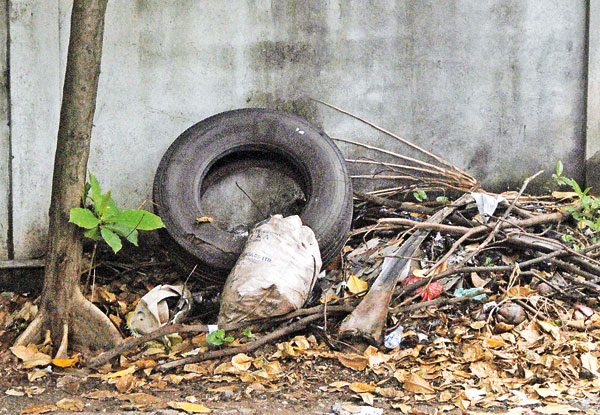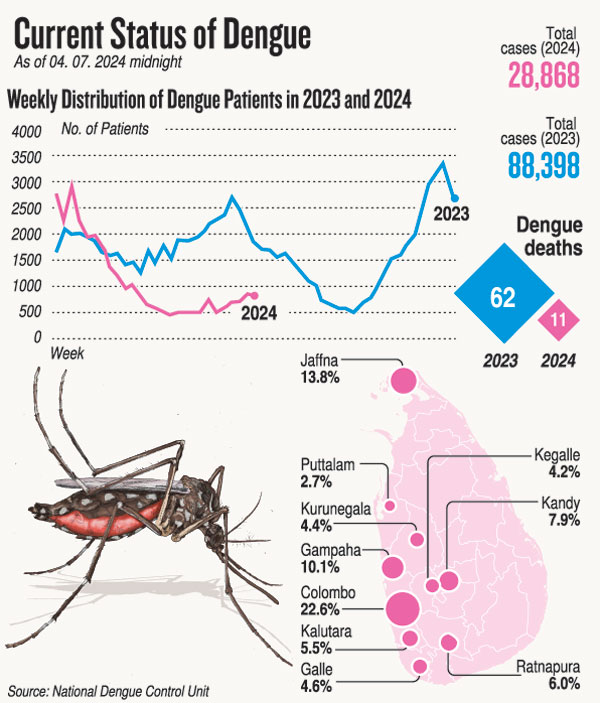News
Dengue danger shows no sign of easing; tally exceeds 28,800 and 11 deaths
View(s):By: Nathara Abeywickrema
The National Dengue Control Unit (NDCU) of the Health Ministry has raised the alarm that there will be an increase in cases in coming weeks, because people are less concerned about the prevention of dengue fever given the wet weather.
The Western Province accounts for almost half of all dengue cases across the country, at 11,028 (38.2%).
The NDCU’s Consultant Community Physician, Dr. Nimalka Pannila Hetti, disclosed that up until the first week of July, there were 28,868 dengue patients and 11 reported deaths throughout the country. 629 cases were recorded in the first five days of July alone.
“The highest number of 6,535 cases is from the Colombo District. 2,907 (10.1%) cases were reported from Gampaha District and 1,586 (5.5%) from Kalutara District,” Dr. Pannila Hetti said.

Accumulated trash provide breeding spots Pic by Nilan Maligaspe
NDCU Director Dr. Sudath Samaraweera said that, in comparison with the previous week, case reporting in the 26th week stayed unchanged. The unit expects a surge in cases in the districts of Gampaha, Kalutara, Ratnapura, Kegalle, Kandy, and Galle, as well as in Colombo.
The surge in dengue cases serves as a stark reminder of the complexities involved in controlling these vectors of disease.
Dengue fever, caused by the dengue virus transmitted mainly by Aedes mosquitoes, has been a persistent public health concern.
The disease manifests as a flu-like illness, with symptoms ranging from mild fever and headaches to severe manifestations such as hemorrhagic fever and dengue shock syndrome, which can be fatal, the NDCU’s Medical Officer, Dr. Lahiru Kodithuwakku, pointed out.
Despite concerted efforts by governments, health organisations and communities worldwide, eradicating mosquito populations remains a daunting challenge. Several factors contribute to the difficulty of eradicating mosquito populations and preventing the spread of the disease.
Mosquitoes, particularly species like Aedes aegypti and Aedes albopictus, have shown remarkable adaptability to various environments. They can breed in small amounts of stagnant water found in urban areas (e.g., discarded tyres, flower pots, gutters) as well as in rural settings (e.g., puddles, containers). Their ability to thrive in diverse habitats makes complete elimination challenging, Dr. Kodithuwakku explained.
Mosquitoes have a short life cycle, typically ranging from a few weeks to a couple of months, depending on environmental conditions. Female mosquitoes can lay eggs multiple times during their lifespan, with each batch capable of producing hundreds of larvae. This rapid reproduction cycle allows mosquito populations to rebound quickly even after significant control efforts, said Dr. Kodithuwakku.
Senior Professor in the Department of Civil Engineering of the University of Moratuwa, Thishan Jayasinghe, underlined how urbanisation has worsened the challenge of mosquito control.
Rapid urban growth often leads to unplanned settlements with inadequate sanitation and drainage systems, creating ideal breeding grounds for mosquitoes. Dense populations increase the risk of disease transmission, amplifying the impact of mosquito-borne outbreaks, Prof. Jayasinghe said.
Describing the role that construction-related building materials have in the spread of dengue, he warns that expanded polystyrene (EPS) packaging materials, used in Free Trade Zone factories, pose a risk of mosquito breeding if not properly disposed of.
He suggested crushing waste EPS into beads and reusing them to create lightweight concrete, which can be used for lightweight interlocking blocks or wall panels.
Prof. Jayasinghe recommends using Cement Stabilised Rammed Earth (CSRE) for well-maintained, clean gardens to prevent mosquito breeding grounds.
Overuse and misuse of insecticides have contributed to the development of resistance in mosquito populations.
Aedes mosquitoes, in particular, have shown resistance to common insecticides used in vector control programmes. This necessitates the development of alternative strategies and the judicious use of insecticides to maintain their effectiveness.
Climate change has altered the temperature and precipitation patterns, influencing the distribution and behaviour of mosquitoes. Warmer temperatures can shorten the incubation period of viruses within mosquitoes, potentially increasing transmission rates, said Dr. Indralingam, a medical officer of the NDCU.
He said changes in rainfall patterns can create new breeding sites or extend the breeding season for mosquitoes, further complicating control efforts.
A multi-faceted approach is needed to combat mosquito-borne dengue fever. It requires a combination of strategies, including environmental modification (e.g., eliminating breeding sites), biological control (e.g., using natural predators of mosquito larvae), chemical control (e.g., targeted use of insecticides), and most importantly, community engagement (e.g., raising awareness and promoting preventive measures), said Dr. Indralingam.
In the meantime, medical experts and specialist consultants alert that hospital admission is required for pregnant women who present with fever, while the community at large is advised to promptly seek medical treatment for any type of fever without resorting to home remedies.

Paracetamol (Acetaminophen) is recommended for the treatment of pain and fever. Aspirin plus, other salicylates, and nonsteroidal anti-inflammatory drugs (NSAIDs) must be avoided, they said.
Advising communities about the importance of eliminating breeding sites is one measure that the PHIs are taking, said Shanaka Bopitiyage, secretary of the Public Health Inspectors Union. Using insect repellents and mosquito nets and seeking timely medical care if dengue fever is suspected will help significantly reduce transmission rates, he said.
Addressing these challenges requires sustained commitment, collaboration across sectors, and innovative approaches to effectively reduce the burden of mosquito-borne diseases on public health, the NDCU said.
The best way to say that you found the home of your dreams is by finding it on Hitad.lk. We have listings for apartments for sale or rent in Sri Lanka, no matter what locale you're looking for! Whether you live in Colombo, Galle, Kandy, Matara, Jaffna and more - we've got them all!

